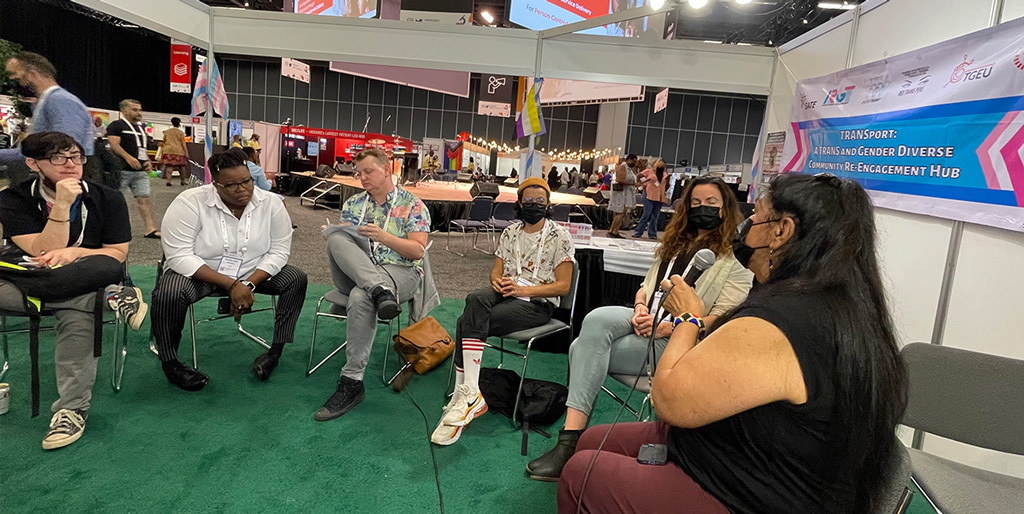Civil liberties and human health must remain high on the public and political agenda; this is the only way to truly ensure the sustainable and equitable development of societies. Walls are not the answer. #PutPeopleFirst!
Ahead of AIDS 2024 and as part of the regional #PutPeopleFirstEECA campaign, VirusOff is launching a series of materials on key issues affecting key communities in the Eastern Europe and Central Asia (EECA) region. In this series, we will highlight current issues and challenges for the communities that will be addressed in Munich, possible solutions, and hear from experts from the region who will also be attending AIDS 2024.
You can also learn more about the EECA region and AIDS 2024 at aids2024.virusoff.info.
This article focuses on recent legislative changes in Georgia and Kyrgyzstan and their impact on access to critical services for vulnerable populations.
In 2024, Georgia and Kyrgyzstan passed “foreign agent” laws that have raised serious concerns among the international community and human rights organizations. These laws significantly restrict civil liberties, with potentially irreparable consequences for the health and quality of life of vulnerable populations both in the countries themselves and in the Eastern Europe and Central Asia (EECA) region.
Georgia
Since the beginning of 2024, the situation in Georgia has become particularly alarming. On May 28, the law on “foreign agents” was finally passed, requiring organizations and individuals receiving foreign funding to register as such. The law imposes strict restrictions that directly affect access to treatment and social services for vulnerable groups. Indeed, many non-governmental organizations (NGOs) that rely on foreign funding to implement their programs will now face additional bureaucratic hurdles and potential fines of several thousand dollars. The introduction of mandatory registration with the National Agency of Public Registry of the Ministry of Justice increases state control over NGO activities, undermining public and donor confidence. Such conditions of increased pressure and risk of repression create an atmosphere of mistrust. They will lead to a decrease in the number of organizations willing to work in the country.
“The potential impact of the law on healthcare programs in Georgia could be significant, especially for HIV programs, where non-governmental organizations are key service providers. If opportunities for work are restricted, the epidemic will grow. This is a pattern we have seen multiple times during the HIV/AIDS epidemic in many countries.”
Tetyana Deshko, Director of the Department of International Programs at the Alliance for Public Health
According to human rights and public health experts, the consequences for vulnerable groups are clear: communities need special support that will now be difficult to provide. For example, HIV prevention and treatment programs may be curtailed due to lack of funding and government pressure, leading to an increase in new HIV cases and a deterioration in the health of key populations.
Maka Gogia, Program Director of the Georgian Harm Reduction Network (GHRN), highlights, that the new legislation poses several significant threats:
The new legislation poses significant threats, among which its worth to highlight:
Maka Gogia.
“Increased State Control: The requirement for NGOs to register as foreign influencers strengthens state control. This could lead to the blocking of donor funding intended for public health purposes if deemed not in the government’s interest.
Discreditation and Removal: The government gains the power to discredit and remove any NGO that does not align with its interests.
Privacy Violations: State entities could access the personal data of staff and clients from stigmatized or criminalized communities within the context of HIV/TB services. This breaches confidentiality and undermines trust in these programs, reducing coverage among the target population.”
LGBTIQ+
The alarming situation of restrictions on the rights of the LGBTIQ+ community deserves special attention. In late March 2024, Georgia’s ruling party proposed constitutional amendments that would restrict LGBTIQ+ rights.
The 19 bills, aimed at combating “LGBT propaganda” and protecting “family values,” include a ban on same-sex marriage and alternative forms of union, as well as the denial of adoption of children by people who identify as gender variant or non-heterosexual. It also proposes to ban sex reassignment surgery and the use of gender markers on documents other than biological sex.
The introduction of “LGBT propaganda” is prohibited in educational institutions, media and public places. In order to monitor the implementation of these norms, a special commission will be created to oversee compliance with the law, and materials promoting homosexual relations will be withdrawn or banned from display and distribution.
According to the Speaker of the Parliament, the bill is expected to be passed in the fall session. Although individual bills are already being passed in their first readings this summer, right now.
Access to OST
At the same time, the Opioid Substitution Therapy (OST) program has undergone changes since the beginning of the year – according to the Ministry of Health’s order, patients or their representatives must now visit treatment facilities daily, making access to treatment much more difficult.
Previously, clients at OST sites could receive a few days’ supply of medication if they were unable to attend, but this restriction has now been tightened, putting the health and safety of program participants at risk. Drug policy organizations, health experts, and community associations have expressed alarm at these changes, believing that they do not adequately protect patients’ rights. In this regard, they have prepared a public appeal by Georgian NGOs to the Ministry of Health.
Such state-level changes not only restrict civil liberties, but also significantly impede the provision of critical services, which can have serious consequences for the health and quality of life of both key populations and the entire population of Georgia. The passage of these and similar bills could increase discrimination against communities in Georgia and lead to even greater isolation and vulnerability.
Kyrgyzstan
On March 14, 2024, a new law was adopted in Kyrgyzstan introducing the concept of a “non-profit organization performing the functions of a foreign representative”. These organizations, which receive foreign funding and engage in political activities, are now required to register and report to the state. Political activities of NPOs include organizing public events, participating in elections, addressing state bodies, and disseminating opinions on state policy.
The adoption of the law on “foreign agents” restricts civil liberties: NGOs are forced to work under increased pressure and risk of repression. Freedom of speech and assembly are endangered, as any form of protest or criticism of the government can be interpreted as “foreign agent” activity.
The law severely restricts the activities of NGOs providing vital services such as medical care and legal psychosocial support. People living with HIV and representatives of other vulnerable groups may be left without access to necessary services, worsening their health and quality of life. This is in a context where state structures are not always able to provide the necessary support, and NGOs are the only source of assistance.
Organizations are starting to leave Kyrgyzstan. The first NGO to announce the termination of its activities after the adoption of the law was the Soros-Kyrgyzstan Foundation, which had been implementing projects in the country since 1993. What’s next?
“In Kyrgyzstan, NCOs will work less on issues related to key groups and human rights. In Georgia, it’s hard to say yet, because representatives of foreign interests recognize anyone with 20% of their funding from foreign sources. It is unclear what will follow. – Mikhail Golichenko, Lawyer, Senior Policy Analyst, HIV Legal Network (Canada), comments on the situation.
“It will be more difficult to work, but a lot depends on what laws the countries will adopt. In Kyrgyzstan, for example, the Ministry of Justice could issue a decree on what specific health activities cannot be considered political activities. In Georgia, on the other hand, it would be good news if additional regulations that create additional difficulties for non-commissioned officers were not adopted.”
Mikhail Golichenko
VirusOff calls for action at all levels – from local and national governments to international organizations and social movements – to support the human rights and urgent needs of vulnerable groups in the EECA region to ensure fair and equal access to health and services.
Civil liberties and human health must remain high on the public and political agenda; this is the only way to truly ensure the sustainable and equitable development of societies. Walls are not the answer. #PutPeopleFirst!
Learn more about Eastern Europe and Central Asia at AIDS 2024 by visiting aids2024.virusoff.info, a special web page dedicated to EECA and AIDS 2024 on the online regional platform Virus OFF.
Follow our social media channels to not miss updates on EECA and AIDS2024:




